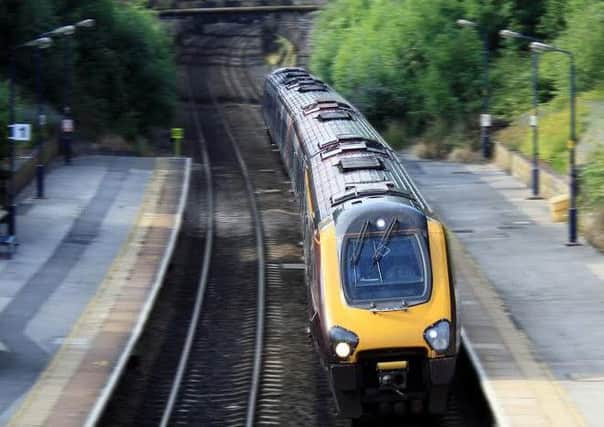Misery for commuters as thousands are forced to stand on services to Yorkshire's biggest cities


In Leeds, 14.1 per cent of 26,000 morning commuters are forced to stand - 3,666; and in Sheffield, 6.3 per cent of the 7.700 travelling in the morning peak period have to stand - 485, official figures from the Department of Transport reveal.
But the percentages are dwarfed by some of the service in London, where as many as a third of passengers are travelling without a seat.
Advertisement
Hide AdAdvertisement
Hide AdIn Leeds, four train operators run services, with Northern providing the majority of local commuter routes.
On an average weekday in 2015, 71,000 passengers were on services arriving into the station, of which 26,000 arrived in the morning peak.
During the morning peak, 2.2 per cent of passengers were in excess of capacity, compared with 1.3 per cent in the afternoon peak.
Advertisement
Hide AdAdvertisement
Hide AdIn total, 14.1 per cent of passengers were standing in the morning peak, and 12.3 per cent in the afternoon peak - and increase from 2014 of 1.8 per cent in both instances.
The highest levels of crowding in the morning peak were on Northern services, with 2.3 per cent of passengers in excess of capacity, However, a higher percentage of passengers were standing on TransPennine Services at Leeds than on Northern services.
In Sheffield, the only other Yorkshire city included in the report, around 32,000 passengers were arriving each average weekday, with 7,700 in the morning peak, and 9,400 in the afternoon peak.
During the morning peak, 1.6 per cent of passengers were in excess of capacity, compared with 0.7 per cent in the afternoon peak.
Advertisement
Hide AdAdvertisement
Hide AdIn total, 6.3 per cent of passengers were standing in the morning peak, and 3.8 per cent in the afternoon peak - and increase of 1.3 per cent and a decrease 0.5 per cent respectively.
TransPennine Express has the highest percentage of standing passengers in both peaks, while the few CrossCountry services that arrive in the morning peak have the highest percentage of excess passengers.
In the nation’s capital, 35 per cent of commuters on services into Blackfriars stand, with almost a third at trains into other stations including Waterloo, Fenchurch Street and Moorgate.
More than 580,000 passengers arrived in London by train on a typical morning peak last autumn, an increase of 3.2 per cent over the previous year.
Advertisement
Hide AdAdvertisement
Hide AdCrowding levels at major cities across the UK rose by 0.4 per cent per cent in the morning peak.
The figures also show that 30 per cent of passengers arriving at London stations between 8am and 9am have to stand, up from 26 per cent in 2011.
This compares with 20 per cent of passengers arriving at Birmingham, 16 per cent in Manchester, and 12 per cent at Cardiff.
The report said: “The worsening crowding levels show that capacity provision is not coping with rising levels of passenger demand, which has been the case in London and a number of other cities.”
Advertisement
Hide AdAdvertisement
Hide AdRail Minister Paul Maynard said: “These statistics reveal the unprecedented scale of passenger demand, with journeys doubling in the past 20 years. We are investing a record £40 billion into the network to address this, delivering 3,700 extra carriages by 2019 and providing a huge boost to capacity through programmes like HS2, Crossrail, and the £6.5 billion Thameslink programme.
“These projects will inevitably cause some disruption while they are carried out, which is why we have capped regulated rail fares at RPI + 0% for this parliament and why we are working hard with Network Rail and train operators to ensure that any inconvenience is minimised.
“The end result will be new trains, better stations, and robust infrastructure to increase capacity, reduce crowding and provide better journeys for all.”
Mick Whelan, general secretary of the train drivers’ union Aslef, said: ‘It’s long been our contention that privatisation has failed to deliver for rail passengers in Britain. We’re disappointed - but not surprised - by these figures.
Advertisement
Hide AdAdvertisement
Hide Ad“Disappointed for those passengers - especially those who are pregnant, or disabled - who have to suffer like this, and for those tourists who come to this country expecting a first class public transport system in a first-world economy.
“Sadly, the privatised train companies are failing to deliver ad this Government is letting them get away with it.
“If you’re standing on your train today, then you’ll be standing on your train in 10 years’ time. Because the government doesn’t care enough to do anything about it and the companies only care about making money, not delivering a service.”